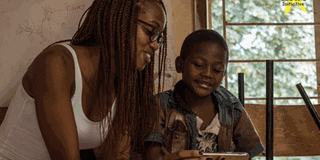BOLD WOMAN: The engineer with a heart for mentoring children

Esther Kamaara and seven-year-old Brian Maswake look at some photos on her phone. Brian is currently at the rehabilitation centre and will hopefully join formal school in 2019. PHOTO| COURTESY.
What you need to know:
- Our work mainly includes mentoring the underprivileged children, establishing feeding programmes and crowdfunding to meet some of their needs.
- The biggest challenge we are facing is sustainability since there is so much to be done yet the resources are quite limited.
- We are planning to start a social enterprise whose proceeds will go to supporting the initiative.
Esther Kaamara, 25, is a telecommunications engineer. Her deep-rooted passion for eradicating poverty led her to start the Star Kids Initiative. She talks to Nation.co.ke about her joy in giving back to the community.
Have you always been interested in social work?
Pretty much yes, I have always desired to help the less fortunate. In December 2013, while still a student at the Jomo Kenyatta University of Agriculture and Technology, I organised a visit to St Monica’s Orphanage in Juja, right next to our school with a bunch of friends. Initially, the visit was a way of giving back to our community, in the spirit of Christmas. However, after that visit, we realised that the children had so many needs and therefore we began the initiative.
Tell us more about the initiative.
It is steered by a team of five friends. Our work mainly includes mentoring the underprivileged children, establishing feeding programmes and crowdfunding to meet some of their needs.
We start with identifying a children’s centre or school that needs help and after that we spend some time there working on a specific project. After we complete the project, we usually move on to the next centre.

Two boys from Songa Mbele na Masomo Centre,.Kamka Nekesa,Chrsitopher K, enjoy some playtime with Esther after one of the mentorship sessions. PHOTO| COURTESY
Our satisfaction is leaving a place better than we found it. However, some programmes such as mentorship run parallel across different centres. The initiative is well structured such that each member has their designated role.
How many children have you been able to work with so far?
Quite a number, it is difficult to ascertain because as I mentioned, we work with different centres and schools.
For example, after spending some time at St Monica’s mentoring the children, we moved to Mother Teresa Primary School in Kitengela where we ran a feeding program for 87 children. Some friends from Mavuno Church donated food items and money that enabled us to build a kitchen and hire a cook who made porridge for the children every day. We set all this up in just one term.

Star Kids volunteer, Mwende Musau, sharing her birthday cake with the children at the centre. PHOTO| COURTESY
Next we moved to a rehabilitation centre in South B called Songa Mbele Na Masomo. The centre caters for those who have dropped out from school and seeks to reintegrate them back into the education system after a year. We are currently running a mentorship programme at the centre that happens during a two-hour session, twice a month.

In December 2017, Esther and her team organised a trip for the children to visit the Nairobi National park. PHOTO| COURTESY
We also work with Mukuru Primary School, where most of the children from the rehabilitation centre go to. The school has more than 1600 pupils.
We partnered with the Turkish International Cooperation and Coordination Agency (TIKA) who helped us convert one of the school rooms into a library.
We are launching a food program at Mukuru Primary school. Currently, each child is required to cough up sh100 per month to cater for food. With Sh900, you can feed a child for the entire school year. Our plan is to crowdsource donations in cash and in kind to support the programme so that the children feed for free.
What is the goal for the initiative?
Our goal is to help children get fair a chance in life. We target children born and living in poverty, who do not have access to what other children do; like education, exposure and mentorship. We hope that through mentor we can expose these children to the vast possibilities of life beyond their daily scope. To inspire them to dream boldly and pursue those dreams.

For Esther, mentoring young children is such great joy. PHOTO| COURTESY
What is success to you?
Seeing a child experience a one-on-one mentorship with a mentor. Last year, one of our mentors called Martin, got connected to 14-year-old boy called Wonderful from Mukuru Primary School. At the time, Wonderful’s mother was ailing of cancer and bedridden and was unable to fend for Wonderful and his two younger sisters. Sometimes Wonderful would carry his lunch from school and take it to his mother.
Martin spearheaded the intervention by our team to help Wonderful’s family. Unfortunately, the mother passed away. Martin has continued to walk with Wonderful who will be sitting for KCPE in a few months’ time.
Wonderful’s story represents what our initiative is truly about. It is the manifestation of the vision. His life will not be the same because he has Martin walking besides him. That is what we seek to do with all the children we interact with.

One of the mentorship sessions for the children at the centre. The session includes singing and games to fully engage the kids. PHOTO| COURTESY
Where do you get the funds to run the initiative?
We rely on friends and family mostly. Any amount goes a long way for us. Our funding is project-based. An example is the library at Mukuru Primary School. We have to pitch and look for partnerships with people who can help, just as TIKA did.

Esther, Sly the dance teacher and Elizabeth who is currently undergoing adult learning at Songa Mbele Na Masomo Centre pose for a photo. PHOTO | COURTESY.
What has been your greatest challenge so far?
Sustainability, especially since we have so much to do and very limited resources. It’s not sustainable to rely on friends and family, or to raise money through projects. We are planning to start a social enterprise whose proceeds will go to supporting the initiative.
Where do you see the initiative in the next five years?
There is the global aspect, where we are trying to reach as many people not only in Kenya. We want to have more stories that are similar to Wonderful’s. We also hope to get more volunteers on board who will readily and gladly join in the fight against poverty.





